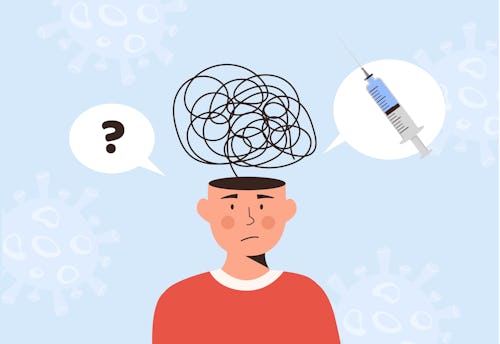
The vaccines that we were all convinced would save us from COVID-19 have been a confusing mess from the jump. It’s been just over a year since the rollout began, and many of us continue to feel confused about what shots to get when. Pharmacists, it turns out, are just as confused as the rest of us, because immunocompromised patients hoping to get a fourth shot — as advised by the government — are being turned away from drugstores.
If you’re confused about this whole fourth shot situation, too, don’t worry. Unless you have a weakened immune system, you likely only need your initial round of vaccination — one shot of Johnson & Johnson or two of Pfizer or Moderna — plus a booster. Scientists have determined that some people with compromised immune systems should get an extra booster, but the CDC guidance on that front has been a little hazy.
In October, per NBC News, the CDC updated its guidance to recommend those with compromised immune systems receive a fourth shot — but they did so with little fanfare, perhaps because that advice was meant for less than a third of the population. And that’s just one of many changes the CDC has made over the year or so since the jabs became available. Sometimes it can feel like if you’re not diligently combing the agency’s website daily, you miss something new — whether it’s how many shots to get, which vaccines make sense for you, or how soon after your last dose you should be getting in line for another one.
To recap, as it stands (for now), adults should get two mRNA shots plus a booster five months later; unless their initial jab was Johnson & Johnson, in which case they may need to get an mRNA chaser plus a booster; and if they’re immunocompromised with certain conditions, they should probably have three mRNA shots — which, in this case, would be considered their primary doses — and then a fourth that’s considered a booster, 5 months later. And that’s just adults — the guidelines for kids in various age groups is a whole other thing. Needless to say, it’s a lot to keep track of.
So, it’s not all that surprising that some pharmacists are confused and turning away immunocompromised people who try to get their recommended fourth shot. “I don’t know any provider who wants to turn away a patient,” Mitchel Rothholz, chief of governance and state affiliates at the American Pharmacists Association, told Kaiser Health News (KHN). “The CDC continues to make updates, and it’s becoming very difficult for providers at the grassroots level to keep up.” Rothholz called the confusion about the fourth shot “inevitable.”
Look, it’s easy to blame pharmacists for denying the most vulnerable people a necessary booster, but some people think the companies that employ those pharmacists are actually the ones responsible. “I feel for the pharmacists because they’re overwhelmed like everyone else,” Alyson Smith, a 52-year-old woman in Chicago who was turned away for her fourth shot, told KHN. “But two years into the pandemic, there is a corporate responsibility to take action when the guidance comes down.”
Rothholz agreed. “I can understand why a pharmacist would say, ‘Corporate hasn’t given us the green light,’” he told KHN.
The vaccines are working; which is why as omicron surges and spreads, it’s more important than ever that everyone who is eligible for a booster is able to get one. Linda Rushing, a 74-year-old immunocompromised woman in Texas, told KHN that she tried to get her fourth shot at three different pharmacies before she was able to find someone educated enough in the guidelines to administer it. “It’s a tragedy to need help and not be able to get it,” Rushing said. Indeed.







